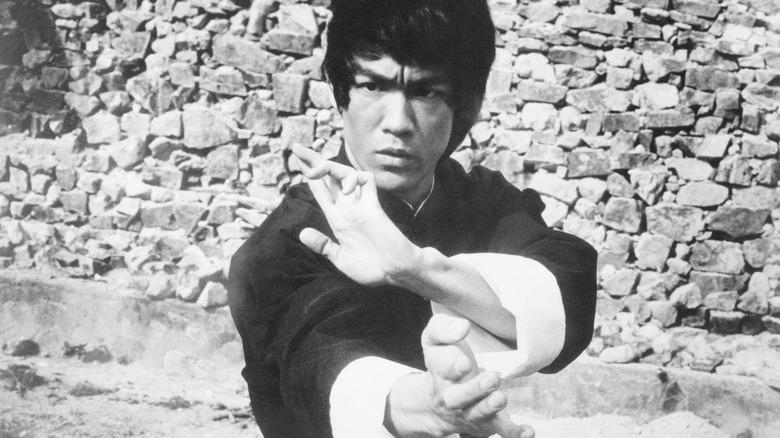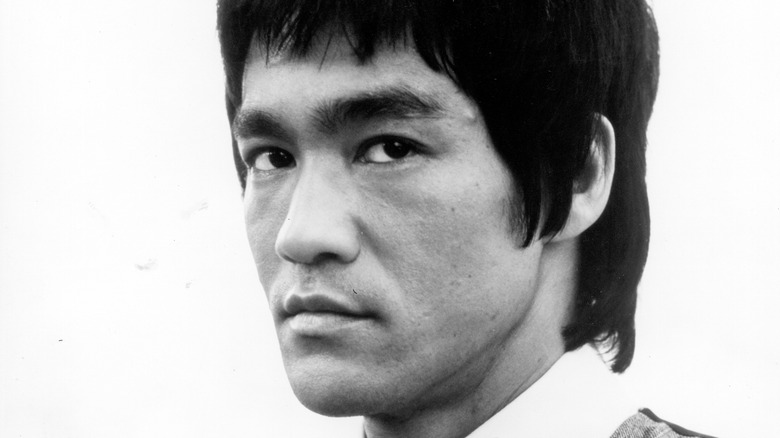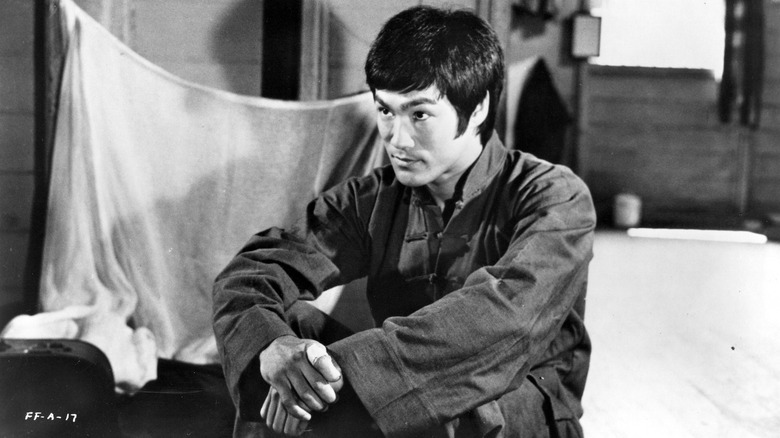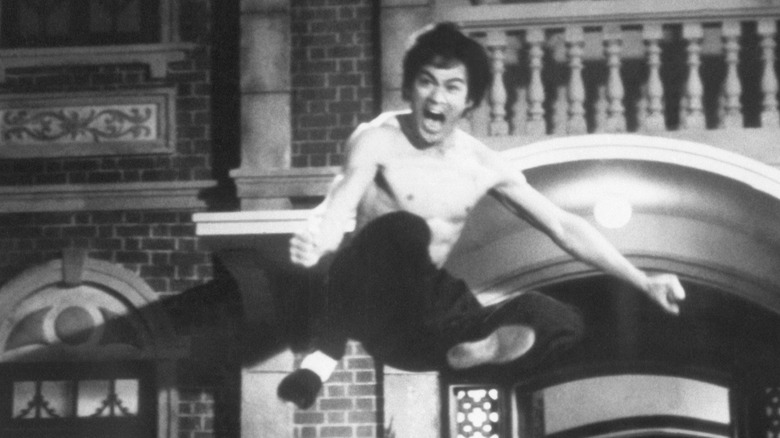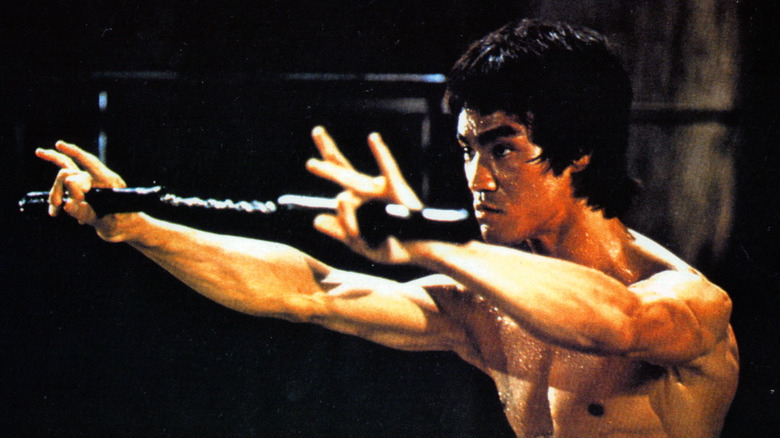The Forgotten Failures Of Bruce Lee
Over 50 years after Bruce Lee's untimely death, he remains the first and last name in martial arts for scores of movie fans. Lee's work in film and television has been given a large share of the credit for popularizing martial arts in the West, though he remained largely unknown in the United States general public until after he died in 1973. His dedication to martial arts outside of entertainment has further enhanced his reputation, to the point where one current practitioner told CNN that Lee was "kung fu Jesus."
That Lee was a gifted performer and martial artist is beyond dispute. His influence on Western pop culture endures in other ways, too; his success was a barrier-breaker for the depiction of Asians in media. But myth can often obscure reality, and some of the details of Lee's life have gotten lost amidst the stories told about him. He wasn't, as he's sometimes been portrayed, a rags-to-riches story, but the son of a well-to-do family. He didn't smoke or drink, but he did use marijuana and hashish. And even "kung fu Jesus" had a few setbacks and failures in the course of his life and career.
Failure was something Lee himself acknowledged. In his book "Striking Thoughts," he counseled: "Don't fear failure. — Not failure, but low aim, is the crime." Lee rarely, if ever, aimed low, and some of the failures he did run into, whether by accident or design, paid off for him in the long run. Here are some of those failures of Bruce Lee's.
His failures as a student helped convince his parents to train him in martial arts
Bruce Lee's biographer, Matthew Polly, called him a "kinetic genius" when it came to martial arts (per CNN). He had a knack for picking up physical combat skills and could very quickly become adept at a new style. What he couldn't learn quickly, at least in his youth, were the basic lessons taught at school. A hyperactive and restless boy, Lee couldn't stand sitting for long hours in the classroom, and despite loving reading in his spare time, could not or would not engage with his textbooks. One of the teachers at his Catholic school (via Polly's "Bruce Lee: A Life") remembered him as "a proverbial devil in the holy water soup," and he regularly failed his classes.
Lee's parents tried to help him by hiring a private tutor, but Lee simply skipped his lessons. Fighting held more of an appeal for him than school, and street gangs were a ready-and-waiting outlet. Lee led his own gang, which was more mischievous than dangerous. But their antics still worried his parents, and his father threatened, and sometimes did, take away performing and theater from Lee as a punishment. His antics continued into college, and he was eventually expelled.
Ironically, martial arts proved a useful outlet for a young Lee's energy, as his teachers and parents all found. One teacher, Brother Edward Muss, introduced him to boxing, and Lee would later blend boxing with the wing chun form of kung fu in a match with an English opponent, and to good effect.
He lost out on the lead role in 'Kung Fu'
Part of the Bruce Lee legend, at least in Hollywood, is how he was cheated out of a TV series. The story goes that Lee developed the basic concept of what would become "Kung Fu," and that Warner Bros, sensing the coming enthusiasm for martial arts, shamelessly lifted the idea after inviting Lee to come up with material for them. In fact, "Kung Fu" was the brainchild of writer Ed Spielman, and was initially intended as a feature film. But Lee was attached to the project early on, having been tipped off about it by Warners executive Fred Weintraub. He was the first choice for the lead role in the film, then titled "The Way of the Tiger, The Sign of the Dragon."
Unfortunately, other than Weintraub, the Warners brass considered a martial arts Western with an Asian star a hard sell to the American public. Lee went on to another movie, and Weintraub had the concept retooled for television. In that transition, which saw the show renamed "Kung Fu," the lead character of Kwai Chang Caine became a reluctant warrior, almost a pacifist, very different from Lee's combative public persona. And his accent proved difficult for Warner's TV head, Tom Kuhn.
Warners still courted Lee, who independently created an unproduced variant of a martial-arts Western for them. But he was out of the running for "Kung Fu." After considering many other Asian actors, the producers of "Kung Fu" opted to rework the character's background and cast David Carradine.
He failed a physical exam for the draft board
Bruce Lee was serious about his skills and his health. The first item on his daily to-do list was meditation. He followed a strict diet, opting for four or five small meals that were heavy on the vegetables. Besides maintaining a rigorous fitness routine, Lee genuinely enjoyed martial combat and sought it out for fun. And yet this was a man who was declared 4-F by the United States military.
As an American citizen, Lee was obliged to register for the draft at age 18. The need to do so (refusal would have cost him his citizenship) was among the reasons Lee was initially reluctant to go to America on his father's orders. But he went and he registered. He failed his physical exam because of a condition from birth: cryptorchidism, an undescended testicle.
Among the possible complications of cryptorchidism is infertility, and for a time, Lee feared that he would be unable to have children because of it. While the condition was left untreated at the time of his exam for the draft board, in 1969, he later had it corrected through surgery.
He felt one of his most famous matches was a failure
One of the more colorful — and controversial — episodes of his life was Bruce Lee's private match with Wong Jack Man, a fellow martial arts master. Both men were originally from Hong Kong and made their way to California in their 20s, but while Lee was working to develop his own form of kung fu and was at times highly critical of older masters, Wong focused on a traditional form of Northern Shaolin.
The circumstances behind the fight have varied depending on the telling; a popular claim is that other Chinese kung fu masters in the area opposed Lee taking on non-Chinese students, but there's little supporting evidence for that. Far more relevant was the issue of Lee's reported arrogance in his criticisms of traditional kung fu, Northern Shaolin among them, and Wong seized the opportunity to promote himself and the school he hoped to found.
Accounts of the fight are similarly varied, with some accounts stretching the match out over 20 minutes. It had only seven witnesses, and the surviving spectators agree that it was a fast and ugly match, one where Lee struggled to get past Wong's defense and was losing stamina before his aggressive offense finally prevailed. It was a victory that, in Lee's eyes, was something of a failure; he felt his performance and his stamina were lacking, and that a narrow, ugly victory was little better than a loss. It was this fight that inspired him to leave kung fu altogether and concentrate on his own, blended form of martial arts.
